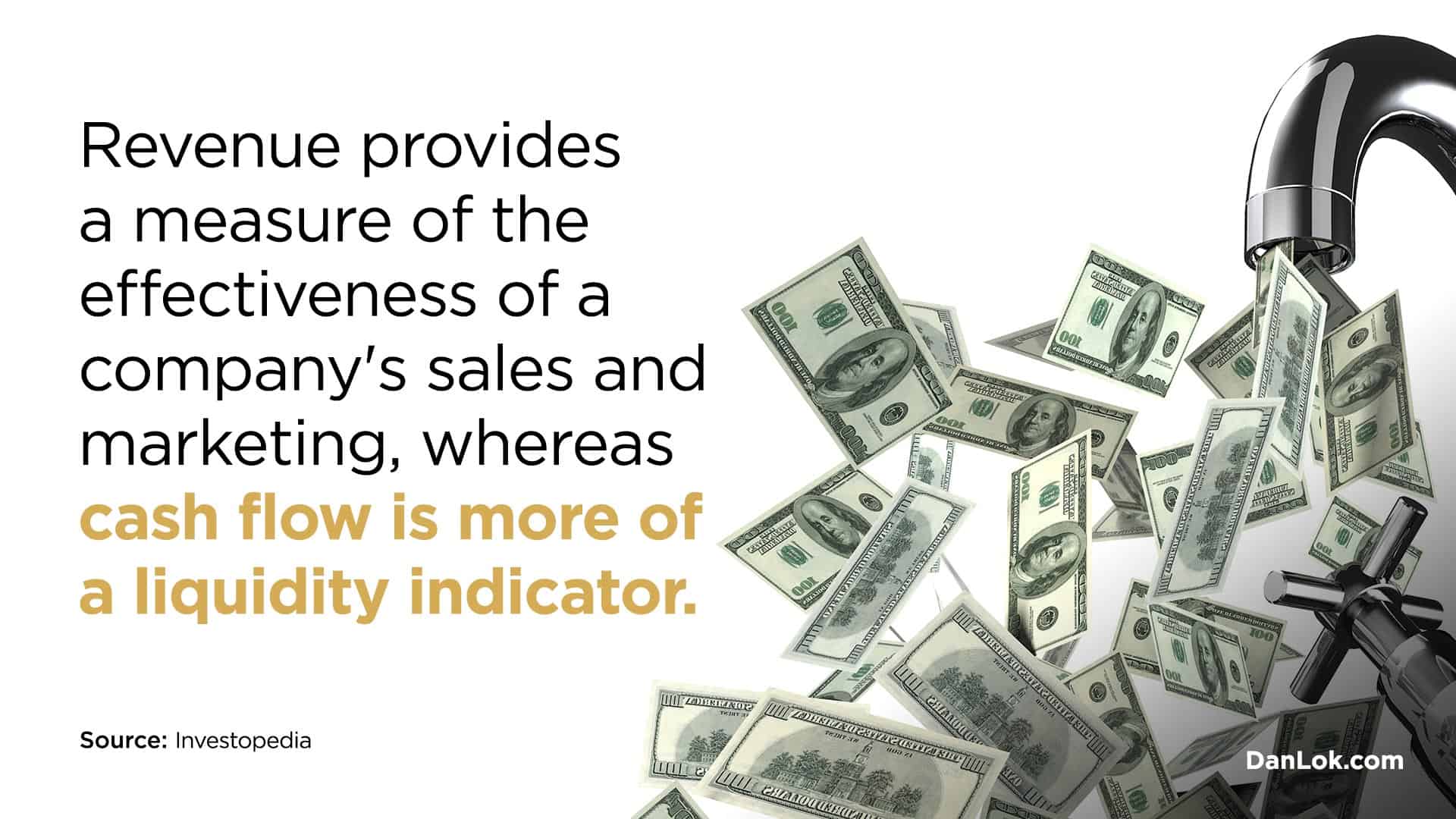Is your business struggling with cash flow in these uncertain times? This is the time when it’s especially important to understand why cash flow is more important than revenue.
As a business owner, it’s your responsibility to know about your business’ financials. If you don’t know it, who would? Even if you have financial advisors and experts on the team it’s best if you have an overview of what’s going on. Financials are the backbone of your business.
Understanding the differences between revenue and cash flow is even more vital in a crisis like now. Knowing the difference might save you from immense loss or even bankruptcy. If you completely outsourced all your financials so far, now is the time to learn about it and take it into your own hands.
Now is the time to make concrete and realistic plans. Positive thinking alone won’t get you out of a tight spot. Deal with the cold facts and develop a strategy accordingly.
Get yourself familiar with terms like cash flow, revenue, margin, and overhead and find out what your business has to focus on in these uncertain times. What’s important will depend on your business model – however for most businesses cash flow is the biggest issue right now.
Why is cash flow so important? How can you prepare your business to survive the crisis? And how can you allocate money fast? Those are some of the aspects we’ll discuss below.

What Exactly Is The Difference Between Cash Flow And Revenue?
The biggest difference is what the numbers tell us. Revenue tells us how much money your company made from sales. Whereas cash flow is much broader. It shows the total amount of money coming in and out. Cash flow also includes money coming in even if it’s not made from sales.
So while revenue shows the gross revenue coming in, cash flow shows the bigger picture. Revenue measures income, your cash flow measures your liquidity.
The thing is, revenue is usually calculated after you made a sale. It doesn’t take into account if you’ve already received the money. So maybe you made $10,000 on paper but you didn’t receive the money yet.
Cash flow is the actual money you have and it allows you to deal with short term financial demand. For example, you need cash flow to pay employees or vendors.
Revenue is more one dimensional. If you sell something for $100, then your revenue is $100. If you sell something for $1,000, then your revenue is $1,000. Simple as that.
Now cash flow also includes the money going out of your business. It shows you how much you have after all your regular expenses are paid. Cash flow allows you to make better predictions if you are breaking even, doing really good, or sliding into debt. So it’s way more important to keep an eye on your cash flow than on your revenue.
Why Cash Flow Is Even More Important In Times Of Recession
When the general economy struggles, cash flow becomes even more important. Do you know why are so many companies going out of business right now? – Because they lack cash. They might have all these accounts receivable but the money arrives on their account too late.
They need cash to pay their employees or even basic expenses like rent. If the cash doesn’t come in, they are gone.
Now, when the global economy struggles, here’s what happens. Almost all companies generate revenue. But it’s only on paper. The vendor of a supermarket might generate revenue from the last delivery.
The supermarket, however, couldn’t give them the cash yet. They made revenue from food delivery orders and are waiting for customers to pay. The customer ordered food with their credit card. They are an employee at a fashion company and didn’t get paid yet because their employer doesn’t have cash flow.
Do you see what’s happening here? It’s almost a vicious cycle. Only when the fashion company finally pays the employee the ball gets rolling. Then the employee can pay the supermarket and the supermarket can pay the vendor and the vendor finally has cash flow.
So, generating lots of revenue sounds great, but your business can’t survive until you are liquid. That’s why cash flow is more important than revenue.

How Can You Understand Your Cash Flow?
To run your business successfully or even weather the storm your business might be in right now, you need financial literacy. What exactly is that?
Financial literacy means you can understand your finances. If you look at financial statements then you know what’s going on in your business.
Many business owners make the mistake to completely outsource their financial affairs. They hire someone to do it. But really, if you don’t know how your company is doing financially how can you run it properly? How can you make wise investment decisions? That’s exactly why you need financial literacy.
When you look at your papers you need to understand which part is revenue and which cash flow. Only then will you know exactly how to react to it.
Now, every business is different and therefore has different cash flow behavior. Maybe your business has a stable stream of smaller sums. Or maybe you make huge sums but less frequently. It also depends on how large your expenses are.
Either way, nearly all cash flow behavior is disrupted in a crisis. You can expect to get paid slower but might be expected to pay faster. Your vendors will likely be less patient with you because they rely on your payment.
Your clients, on the other hand, might struggle and not pay you in time. It’s unfortunate but it can’t be helped. Instead of focusing on them, you need a game plan about what you’ll do if you need to pay faster than you get paid.
Know Your Data And Create A Plan
Now that you understand cash flow and have basic financial literacy, here is the next step. You want to get familiar with your data and make a plan.
It could be a 60 or 90-day plan, telling you the cash that will be required in the next period. After you have your plan, it’s time to get resourceful. An important thing to mind during this step: don’t manipulate your data to make yourself feel better.
Maybe you are facing the harsh truth that your numbers are in the red…or maybe you want to make some estimates which are too generous and not realistic, but would make you feel better…don’t do that. Be as honest with yourself as possible. Probably even better to be a tiny bit more pessimistic than you usual. Lying to yourself won’t get you out of tricky situations.
Most business owners will either underestimate or overestimate the cash flow they need. It’s hard to meet the exact number when you are making guesses and estimations. To be prepared for the worst, it’s better to overestimate than underestimate your cash flow needs.

Evaluate Your Resources
Now that you know your numbers, it’s time to look at your resources. Are you confident to make it through the next 60 or 90 days? Where can you get the money? Can you ask your bank? Is it readily borrowed?
Hope for the best but really prepare for the worst. Use the power of negative preparation and leave nothing to chance. Negative preparation means to ask yourself the questions: What do I not know? What am I not seeing? What’s the worst that could happen? These three questions will allow you to prepare for a worst-case scenario.
Again we want to stress, it’s important, to be honest with yourself about this. If you see no chance to increase the cash flow to your needs, what’s your backup plan? What do you do if something unexpected comes up?
Think about how you could possibly get more new (or repeated) customers in. That’s a good way to raise cash flow. Maybe you can tap into a new market? Maybe the crisis opened up a new opportunity for you?
How can you shorten the transaction length to get some cash flow earlier? Is it possible for clients to pay an amount upfront? Do you have private capital to invest in your business right now? Or could you find investors to support you? All of these are strategies to get you through when things are tight.
What To Include In Your Plan?
Besides cash flow, you also want to know your monthly gross margin. Now, what’s that? Your gross margin is basically telling you how much money you earn per sale minus the cost of getting your product sold.
For example, a digital agency might sell consulting for $2,500 but they also spend $300 on marketing. That means the gross margin for this product is $2,200.
If you had to adjust your strategy during coronavirus pandemic, then your margin might have changed too. For example, a restaurant that relies on a physical location has a certain margin. But now, they can only do delivery. The margin very likely has changed.
The next thing to think about is which expenses are absolutely necessary. What can be delayed and what can be cut completely? For example, you might still need your best employees to keep the business running. Their salary is a necessary expense you can’t delay. You’ll also need some form of marketing, to attract clients.
Delaying certain expenses gives you the opportunity to keep some cash flow for more urgent matters. What can you delay? Maybe there is a possibility to pay your rent a bit late? Are some higher-paid employees willing to take a temporary pay cut? Maybe even suspend their pay? Seek open communication with them about their current situation.

Should You Cut Your Marketing?
The marketing budget is usually the first thing you’d want to cut. It sounds like a good idea to keep your marketing budget so you have more cash flow right?
But remember, without marketing, you’ll have fewer clients which means flower cash flow. Marketing sometimes takes a while until the effects are noticeable. That’s why you think you can cut it for now. The potential risk is, however, that by the time the lockdowns are over you are left with no clients as you didn’t do any marketing.
Before you cut any expenses, do in-depth research and strategizing session. Even cutting the pay of employees can create long-lasting damage. It could destroy the team it took you years to build. Make decisions you feel comfortable with.
How To Increase Cash Flow
Now you know why cash flow is more important than revenue. But how can you generate more revenue during the downturn? Here are a few strategies.
Add A Strong Guarantee
First, you can increase your sales by giving better guarantees and warranties. This might sound counter-intuitive. Won’t your customers abuse your guarantee? If your product is good, then the opposite is true. Here’s why:
Most customers feel reluctant to buy because all the risk is on them. If there’s no guarantee the decision to buy is so much harder for them. If you offer a strong guarantee or warranty, you reverse the risk. All the risk is now on you.
But since your product is good and does what you promise it does, there’s nothing to worry about. Most people won’t use the guarantee if they are satisfied. So, for nearly all businesses a good guarantee (which has no loopholes) increases sales. But it doesn’t cost more to sell the same product with a guarantee. Hence, you have more cash flow.

Engage New Customers
Another great way to increase the cash flow is to actively look for new customers. What are some untapped markets you can branch out to? Maybe you’ve done a lot of local business and don’t have many online solutions? Now is the time to go online and build a customer base there.
Selling an online product is so great because you don’t have much overhead cost. For most, you don’t have to keep any stock – as the product is digital and not physical. The customer doesn’t have to wait for delivery but can get started right away. This is especially true for info products or online coachings.
Low overhead costs but increased sales result in more cash flow. Sometimes, what you sell only needs to be tweaked slightly so it can be sold online. It’s one of the best ways to increase cash flow during the lockdown.
Dare To Release Beta Products
Do you have any upcoming new products or services which aren’t fully finished? Instead of fleshing everything out to complete detail, it will pay off to release your product early.
Especially if what you created helps others to get through the downturn. For example, maybe you offer online coaching on how to take your business online. But the last two modules aren’t recorded yet. You’d want to release the program already and make sales as you finish it.
Most of your customers won’t mind or won’t even notice. By the time they get through the program, you’ll have everything set up for them.
Alternative Pricing Structures
If you need cash flow fast you might want to adjust your pricing structures. If customers aren’t able to pay the full price upfront, maybe they can pay half? Maybe even offer them a payment plan over the next three months – that way you get cash in every month.
Many businesses offer gift cards that allow them to generate cash now and take care of the fulfillment later. This is best marketed to customers who are already loyal and want to support your business during tough times.
You might be tempted to offer your product or service for cheaper for the sake of making cash flow faster. But often it’s not necessary. Just extending the payment period over a few more months helps. Fall back on payment plans before you start giving discounts.

Want More Money Habit Secrets?
You’d be surprised but most business owners don’t know much about the differences in revenue and cash flow. It’s easy to start a business but it’s a lot harder to maintain it – especially if an unexpected crisis hits.
You might have noticed that Dan Lok’s businesses have taken a very minor hit from this recession. He didn’t have to let go of any employees, he still has his marketing running and he released some new solutions in the last months.
How was he able to do that? The thing is, Dan Lok has seen five recessions during his time in business. So, he naturally adopted some money management habits that keep his business safe.
If you want to crisis-proof your cash flow and income, wouldn’t it be valuable to learn from his experience? Right now you can do so, with the Millionaire Money Habits Video Training. Right now you can get the training and save 50%. View all the details right here.





